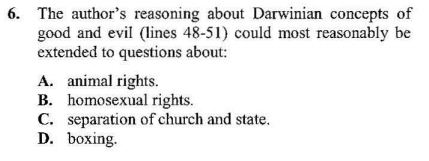@DoctorInASaree
Also, when you read the actual passage for verbal, do you read with the mindset of mapping (knowing which info is where and main idea) or the mindset of classifying the argument as deductively/inductively good/bad --- I know the former is the more common thing everyone does, but I feel the latter forces you to wrestle more with the evidence/conclusions but prob more time-consuming. Your example passages seemed to imply the mapping mindset more.
Right, so both are important. After pre-reading the question stems we're looking for x,y,z, but making sense of the passage is also important. Does deductive/inductive reasoning have a role to play? You bet!
Let's split this into two parts Deductive Reasoning (DR) and Inductive Reasoning (IR)
(1) Deductive Reasoning: [for a serious definition read the strategy on page 1]
Top-down logic. We start with a broad (macro) topic, and the author will, by the end of the passage, come to a definite conclusion. Imagine that there's a sculpture hidden inside of a stone...a deductive argument will peel away logically sound layers of the rock (premises) in order to reveal the sculpture - the conclusion.
Does this sound familiar? Standard passages anyone?
😉 Knowing this, we should be "mapping the passage" like so:
(1) Introduction of macro topic - Capital Punishment should be used to punish rapists
(2) Supporting argument 1 - Some crimes cannot be forgiven - rape (proof a and b)
(3) Support argument 2 - Such crimes are committed by people who are beyond help (proof c and d, etc.)
(4) Supporting argument 3 - another powerful argument
(5) Therefore, I conclude that "..."
DR tip: Remember, with a deductive argument, if the premises are sound - the conclusion will be TRUE.
- The supporting arguments are narrow and apply only to the topic at hand (say rape cases). Why? The more general the premises the higher the probability that it can be proven false. This is the opposite of IR. We'll get there in a moment.
How does the author prove those supporting arguments (premises)? And what sorts of inferences are made? That is how I test deductive arguments.
Now it's time to answer passage questions. What is the crux of the passage? The crux of a deductive argument is always contained in its conclusion. Isn't this true? What of the remaining questions? They are ALL PoE questions. What does PoE of a deductive passage mean? We're testing its premises. The beauty of this, is that we just did, hopefully, a good job of that while reading the passage!
(2) Inductive Reasoning
Bottom-down logic. Begins with initial information that covers a broad domain - generalizations. Think of stereotypes
😛 Inductive conclusions are not true, but they may "likely to be true" - depending on the strength of its premises.
It would go something like this:
Statement 1: 100% of the Indian girls that I know have had forced marriages.
Conclusion: If I meet a married Indian girl - she will have had a forced marriage.
Is the conclusion true? No
😀 Is it likely to be true? Perhaps, depending on how the author proves Statement 1.
So, when reading a passage, ask yourself
Am I reading a top-down or a bottom-up passage? Right away you'll figure out whether it's a DR or IR passage 😉
Let me know I have missed anything...dinner awaits! Goodnight.


 !
!